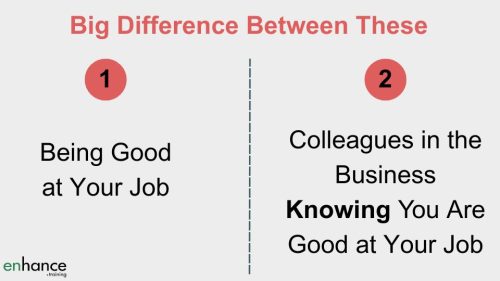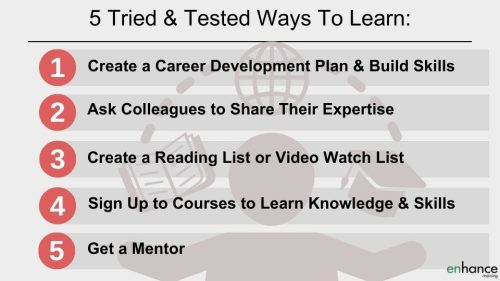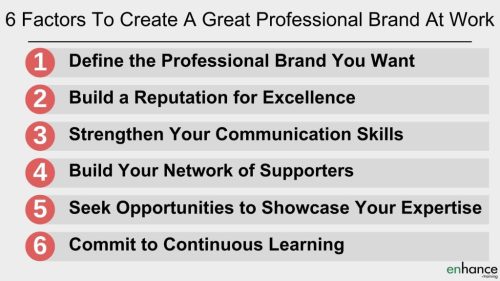6 Factors to Create a Great Professional Brand at Work

With huge competition in the workplace, creating a great professional brand at work gives you many advantages. 5 key advantages of having a strong personal brand at work are:
- You’re given work more suited to you and hopefully you enjoy doing more
- Management has a clearer understanding your strengths and motivations
- You’re given the better projects, activities and tasks in terms of building your experience and skills
- You’ll have higher visibility within you organisation – more people feel they know you and understand what you offer
- You’ll get promoted quicker because you have more opportunity to add additional value to the business
6 factors Create a Great Professional Brand at Work
- Define the Professional Brand You Want
- Build a Reputation for Excellence
- Strengthen Your Communication Skills
- Build Your Network of Supporters
- Seek Opportunities to Showcase Your Expertise
- Commit to Continuous Learning
Working to create a great professional band at work will help you at every level from school leaver to board director.
Consciously planning out how you are going to strengthen your professional brand will improve your brand quicker and you will have more control over the reputation you build. In our very competitive workplaces, working hard alone is not enough build a successful career.
Watch on YouTube
Listen on Podcast
Define the professional Brand You Want – The first factor to create a great professional brand at work
Going through the process of defining the professional brand you want helps ensure you are providing consistent messaging to your colleagues and management. This consistent messaging reduces confusion and increases the strength and clarity of your professional brand.
Start by understanding the values you hold important in the workplace. For example some of mine are being open, being honest, being fair, and putting team before myself to a point. Your values rarely change quickly so they are very good reference points to guide your behaviours, choices, and actions.
Then consider your strengths and skills. What are you good at and what do you want to be known for and what do you like doing. The more you can focus other people on your stronger areas, the more of this type work you will get, thus allowing you to play to your strengths.
Finally, consider your career ambitions. What position are you aiming to reach? What route do you plan to take to get there? What are your next one or two roles on that journey and what experience do you need to get those roles? Creating a strong career development plan will help at this stage.
When you can define your brand in terms of your values, strengths, skills and aspirations, you can then work on communicating your professional brand at work.

Build a Reputation for Excellence – the second factor
Being known for being good at your job gives you a lot more opportunities at work. Managers want less hassle and stress, for their projects and activities to go well, to hit their targets, and to impress their bosses. One of the best ways of achieving all these as a manager is to get the best staff you can working on your activities and projects.
When you are good at your job, you are in demand from all the managers in the business. You have choices and opportunities.
Work at delivering the best output, results, and value you can for those you work for. This means going the extra mile, working a bit longer than others, working smarter than others, investing in yourself more than others – anything that sensibly increases your skills and what you produce to be above the average of your peers.
Being good at what you do and making sure others know you are good at your job are two different things. Of course managers talk and word should get around that you are good. When you have worked hard to become good at your job, leaving the communication of how good you are solely to others, in my view is not sensible. So work out how you are going to market your worth and what you do professionally, to your manager and their peer group as a minimum.
Taking the extra step of communicating your worth, will speed up the building of your reputation and it will help you get the reputation you want.
Strengthen Your Communication Skills – The third factor to create a great professional brand at work
How well you communicate is at the core of building a strong professional brand. If colleagues, managers and leaders don’t know or don’t understand how you can help them and why they should pick you, a lot more of your skills and experience will be wasted on unexciting work or work that doesn’t more your career forward – compared to those who do communicate this clearly.
Work on improving your verbal, written and non-verbal communication. Think about your audience and how you are going to help your audience take in and understand your message quickly. Get better at asking questions to improve your understanding of situations and your audience. Practice effective listening – the words being said and the non-verbal communication – so you can adjust your communication style and content. Learn how to speak clearly, concisely and with structure to improve your audience’s understanding. Craft professional emails and reports, paying attention to grammar, tone, and the key messages.
Work on building rapport and collaborative relationships with your colleagues. Improve your diplomacy skills so you can be more direct and more honest without offending.
Your online presence should support and align with all your real world efforts. Keep your LinkedIn Profile up to date and aligned. Keep everything you do online positive and supportive of your professional brand.
Remember – strong communication skills will enhance your credibility and help you build stronger relationships and a wider range of relationships throughout the workplace.
Build Your Network of Supporters – the Fourth factor
Networking at work plays a vital role in establishing and expanding a great professional brand at work.
Managers and leaders provide the best opportunities to those staff member they know, like and trust. Use this aspect of human nature to your advantage. Get to know the managers in your business. Research and find out talking points they are interested in. Ask them about the sports they play or watch, the hobbies they might do, the projects they are currently working on or what they are championing at work.
Make opportunities to speak to these managers and leaders. Do research and build insights that would help them. Find and solve problems that impact them or their teams. Pop round to their desks and share what you have done with them and then move the conversation to areas they are keen on talking about.
Create professional and personal connections. Then turn these individuals into keen supporters of you through how you help them. These actions will contribute to building a great professional brand at work.
When you are confident in networking internally, work to develop relationships in your industry. Offer value to others and be open to collaboration.
A strong network of supporters, internal and external, will provide you with many more opportunities than those that don’t network.
Seek Opportunities to Showcase Your Expertise – The fifth factor to build a great professional brand
Seek out opportunities to share your knowledge, insights, and skills. When speaking to colleagues and managers, be interested in what they are working on and ask lots of questions to unearth great opportunities for you to gain the experience you want while helping them and the business.
Ask to be included on projects that play to your strengths and explain why you should be included. Persuade managers to provide your good career building opportunities by communicating your track record and ask your network of supporters to vouch for your skills and effectiveness at delivering results.
Help your manager sell your expertise into the wider business by being clear about what you are working on and the results you are delivering. For example, create a scorecard and talk through this in your one-on-one meetings with your manager. You could advertise your results and expertise by circulating your scorecard more widely in team newsletters, reports and similar.
Use your network, colleagues, and manager to identify opportunities to showcase your expertise and ask for the opportunity to do the work.
The best way to find opportunities
During my career, I found the best opportunities to showcase what I could do have come about because I spotted an opportunity and persuaded managers of the benefits to the business of taking action. I remember spotting an opportunity to add over £20m in cash to my company’s bank account. I had to do the research, create a business case, present that case to the leadership team to get their permission to do the project and then persuade other departments to help. The project involved some risk and had to overcome some vested interests so getting permission what not guaranteed. I got permission and the project added more than £20m to the company’s bank account and I got some amazing experience and results to add to my CV. This project was also an amazing opportunity to add to my professional brand at work.
The more you are able to work on activities and projects that play to your strengths and support your professional brand at work, the quicker you will create your professional brand and the stronger your professional brand will be. Go looking for great opportunities to build your professional brand.

Commit to Continuous Learning – The sixth factor to create a good professional brand
In business, nothing stays still for long. To remain relevant, to be able to continuously maintain or increase the value you provide to your employer, you must commit to learning new skills and improving the skills you have.
As the business requirements change, how are you going to adapt to these changes? How are you going to keep up to date with the trends in your industry?
There are so many ways to learn. Here are 5 tried and tested ways to learn that are independent of your boss and company:
- Create a career development plan and actively build the missing skills you need
- Ask colleagues to explain how they solved a specific problem or delivered a project
- Create a reading list or a video watch list and go through your list
- Sign up to courses that will help you build knowledge, solve specific problems, and build skills.
- Get a mentor to guide you and help you build better experience and skills
Commit time and energy to keep learning so you keep yourself ahead of your competition. The will and ability to learn is a powerful element of your personal brand at work. Commit to continuously learning.
In Summary
Creating a strong professional brand at work is almost essential to do well in any career. There is so much competition for the most interesting work, activities, and projects. Building a great professional brand will help get you and keep you ahead of your competition.
Yes, it does take time and effort to build your professional brand at work. I would argue that it takes a lot more work and effort to get similar benefits for you personally when you don’t specifically put in the effort to build your positive personal brand at work.
To recap, these are the 6 Factors to Create a Great Professional Brand at Work we have gone through:
- Define the Professional Brand You Want
- Build a Reputation for Excellence
- Strengthen Your Communication Skills
- Build Your Network of Supporters
- Seek Opportunities to Showcase Your Expertise
- Commit to Continuous Learning
This is not an exhaustive list. Working on each of these factors will go a long way to creating a great professional brand at work for you.






